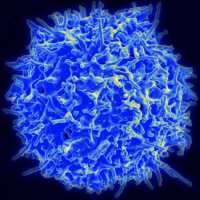Duvelisib Drug Trial for Refractory T-Cell Lymphomas

Just thought I would post that my husband started a Phase II Drug Trial yesterday to treat his refractory PTCL-NOS. The Protocol TItle is Phase II Trial of Duvelisib in Combination with Either Romidepsin or Bortezombid in Relapsed/Refractory T-Cell Lymphomas.
My husband was diagnosed with prostate cancer in April 2016. The cancer was aggressive and had spread slightly outside the prostate, so neither the seeds nor surgery were a good option. He therefore had external beam radiaiton with androgen deprivation therapy (Lupron) for 18 months following radiation. Thus far, he is still clear of prostate cancer.
In August 2017, a mass of swollen lymph nodes was found in his abdomen between his stomach and his pancreas. This was diagnosed as PTCL-NOS. We live in central Massachusetts, so he chose to be treated by a T-Cell cancer expert at Dana Farber Cancer Hospital in Boston. The long-term treatment plan was (and still is) to get the cancer into complete remission and then perform an autologous stem cell transplant. He underwent 3 chemotherapy treatments using CHOEP; after the third treatment, a petscan revealed that, although the abdominal mass had been eliminated, there had been no change in infected lymph nodes in the neck, chest, and pelvis. So the doctor stopped the chemo treatments because he felt they were not working well enough.
Yesterday, my husband began participating in this drug trial. It consists of 28 days of taking the pill Duvelisib (which is the trial drug). If the Duvelisib causes complete remission, then he will stay on it until they are ready to perform the stem cell transplant. If it does not create complete remission, then he will be treated intravenously once a week with Romidepsin for the next 28 days, in conjunction with the Duvelisib.
Comments
-
Update on PTCL Treatment
I am updating my husband's treatment journey. He started a Duvelisib Drug Trial in November of 2017. In January of 2018, Romidepsin was added to the treatment plan. Later that month, he developed heart block, and had to go the ER to have a pacemaker installed. He continued on the Duvelisib/Romidepsin combo until April 2018, when he developed drug-induced colitis from the Duvelisib, and had to spend 8 days in the hospital for his colon to mend. That was the end of the Duvelisib/Romidepsin experience. He was given the spring and summer to heal with no treatment, and then had a petscan and biopsy in in August, which revealed that the PTCL was back to more or less the same level as when he started his cancer journey. In addition, the biopsy revealed that he now also had SLL (Small Lymphocytic Lymphoma), and Sarcoidosis. In October, he started Bendamustine/Rituximab, which he was given until March of 2019. A petscan in May showed some improvement, so he again was given the summer off treatment. A CT scan in December 2019 showed increased size and number of cancerous lymph nodes, so he started on Brentuximab in January 2020. The hope is that the Brentuximab will get him into remission so that he can have an allogeneic stem cell transplant.
0 -
So sorry to hear this
If I might ask, where is your husband being treated? For the record, I had double relapsed PTCL-NOS, part of which then became Angioimmunoblastic T-Cell Lymphoma. From years of treatment and probably age, I also developed Myelodysplatiuc Syndrome (MDS) in my marrow at 26%. So, three simultaneous cancers. A regimen called TREC (Treanda, Rituximab, Etoposide, Carboplatin) was in trial at the time. Dr. at SCCA dropped the Rituxan, as I had no B-cell involvement. So, it was then "TEC" and two infusions completely eradicated two dozen tumors, spleen and small intestine involvement. That was the green light I needed to transplant.
I would most certainly ask about TREC, as it is aimed at B-Cell malignancies, but was also amazingly effective against a myelpoid cancer.
0
Discussion Boards
- All Discussion Boards
- 6 CSN Information
- 6 Welcome to CSN
- 121.6K Cancer specific
- 2.8K Anal Cancer
- 446 Bladder Cancer
- 308 Bone Cancers
- 1.6K Brain Cancer
- 28.5K Breast Cancer
- 395 Childhood Cancers
- 27.9K Colorectal Cancer
- 4.6K Esophageal Cancer
- 1.2K Gynecological Cancers (other than ovarian and uterine)
- 13K Head and Neck Cancer
- 6.3K Kidney Cancer
- 671 Leukemia
- 791 Liver Cancer
- 4.1K Lung Cancer
- 5.1K Lymphoma (Hodgkin and Non-Hodgkin)
- 234 Multiple Myeloma
- 7.1K Ovarian Cancer
- 56 Pancreatic Cancer
- 487 Peritoneal Cancer
- 5.4K Prostate Cancer
- 1.2K Rare and Other Cancers
- 534 Sarcoma
- 719 Skin Cancer
- 646 Stomach Cancer
- 190 Testicular Cancer
- 1.5K Thyroid Cancer
- 5.9K Uterine/Endometrial Cancer
- 6.3K Lifestyle Discussion Boards
